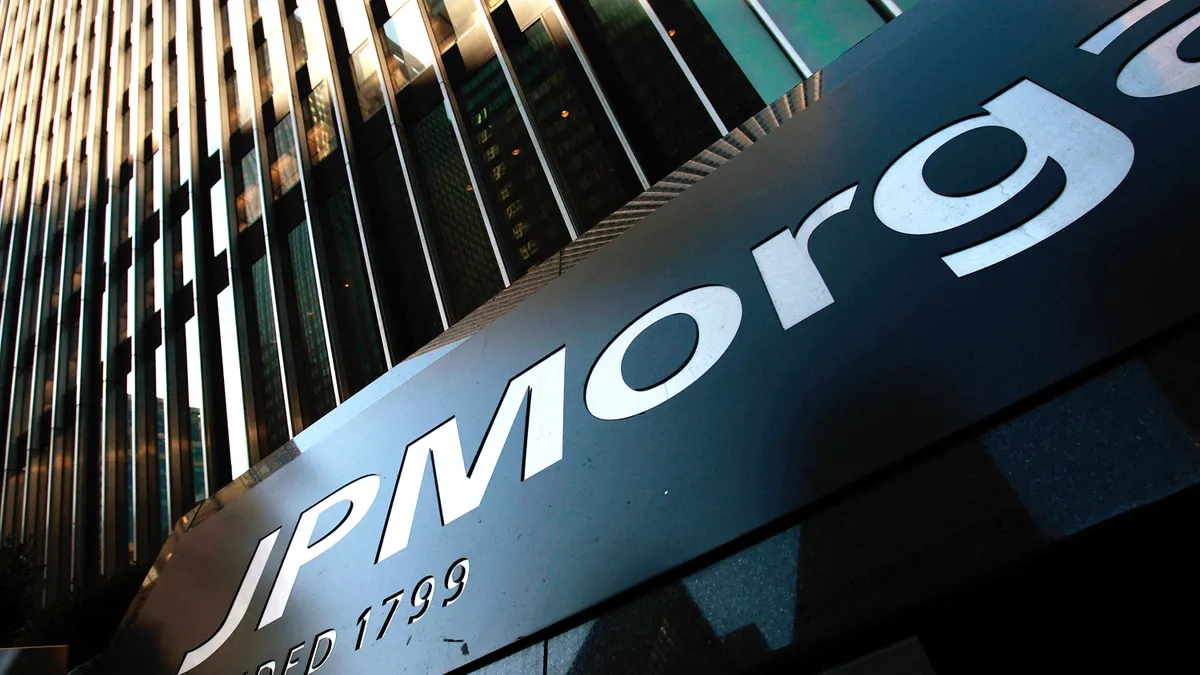Dive Brief:
- Two JPMorgan Chase precious-metals traders, Michael Nowak and Gregg Smith, were convicted Wednesday on charges including spoofing, wire fraud, commodities fraud and attempted price manipulation.
- The jury acquitted a third defendant, Jeffrey Ruffo, a sales executive assigned to the precious-metals desk.
- All three were found not guilty on a separate racketeering charge.
Dive Insight:
The trial punctuated a seven-year effort by the Justice Department (DOJ) to crack down on spoofing — a practice, outlawed in 2010, in which traders typically submit, then cancel, a large number of orders to create the appearance of heavy supply or demand to shock the market or trick others into trading at a more desirable price.
JPMorgan in September 2020 agreed to pay a $920 million penalty to the Commodity Futures Trading Commission (CFTC) to settle allegations the bank manipulated the precious metals and Treasury markets over eight years.
Wednesday’s actions bring to 10 the number of former Wall Street traders convicted in the DOJ’s anti-spoofing campaign, the department said.
Nowak and Smith will be sentenced next year, said the judge in the case, Edmond Chang of the U.S. District Court for the Northern District of Illinois. They each face up to 20 years in prison, but precedent indicates their sentences could be much lighter. Former Deutsche Bank gold and silver traders who were convicted in a 2020 spoofing case received sentences of a year and a day.
Another JPMorgan metals trader, Christopher Jordan, faces trial separately.
“Today’s conviction demonstrates that no matter how complex or long-running a scheme is, the FBI is committed to bringing those involved in crimes like this to justice,” Luis Quesada, assistant director of the bureau’s Criminal Investigative Division, said in a statement Wednesday.
Prosecutors sought to show that between May 2008 and August 2016, JPMorgan — and Smith and Nowak, in particular — flooded the market with buy and sell orders they never intended to execute.
The alleged fake trades “represented 50 [percent] to 70% of the visible gold and silver markets at a particular time” Assistant U.S. Attorney Lucy Jennings told the jury during opening arguments, according to the Financial Times.
Prosecutors used charts of trades and orders to show a pattern they said was spoofing. What the Justice Department lacked, in contrast to other spoofing cases, were chat records or other messages revealing the traders’ intent.
Smith’s attorneys said prosecutors cherry-picked a handful of trades to justify why he traded so quickly and successfully, The Wall Street Journal reported. Smith used his mouse to manually enter and cancel orders so fast that colleagues joked he needed to put ice on his fingers to cool them down, according to trial testimony.
The prosecution’s witnesses included two former JPMorgan co-workers — John Edmonds and Christian Trunz — who testified about market manipulation by all three defendants. A third trader, Corey Flaum, called out similar behavior by Smith and Ruffo when they worked at Bear Stearns, according to Bloomberg.
Trunz, for example, testified that Smith spoofed “all the time,” according to The Wall Street Journal, and that he learned how to spoof by looking over Smith’s shoulder. Trunz pleaded guilty in his own case in 2019.
Edmonds, who pleaded guilty in 2018, testified that Ruffo sometimes encouraged spoofing. Defense attorneys, however, asserted that Ruffo was not a trader, and that there was no evidence he understood traders’ tactics ran afoul of the law, according to Reuters.
Defense attorneys also aimed to undermine the witnesses’ credibility. Edmonds, for one, admitted he lied to FBI agents when they first approached him about his trading. Trunz, too, lied about spoofing in 2016 — to JPMorgan’s compliance team, he said.
JPMorgan declined to comment to the Financial Times on Wednesday’s verdict.
Prosecutors alleged spoofing was crucial to the bank’s ability to serve hedge-fund clients, The Wall Street Journal reported. Jurors didn’t find, however, that the bank’s precious-metals desk operated like a criminal enterprise.
“While we are gratified that the jury acquitted Mr. Nowak of racketeering and conspiracy, we are extremely disappointed by the jury’s verdict on the whole, and will continue to seek to vindicate his rights in court,” David Meister, Nowak’s lawyer, told Bloomberg in an email.
“Mr. Ruffo, his family and we always believed in Jeff’s innocence and are grateful that these unfortunate charges are now behind him,” Ruffo’s lawyer, Guy Petrillo, told the outlet in an email.
An attorney for Smith didn’t respond to messages from the wire service seeking comment.













